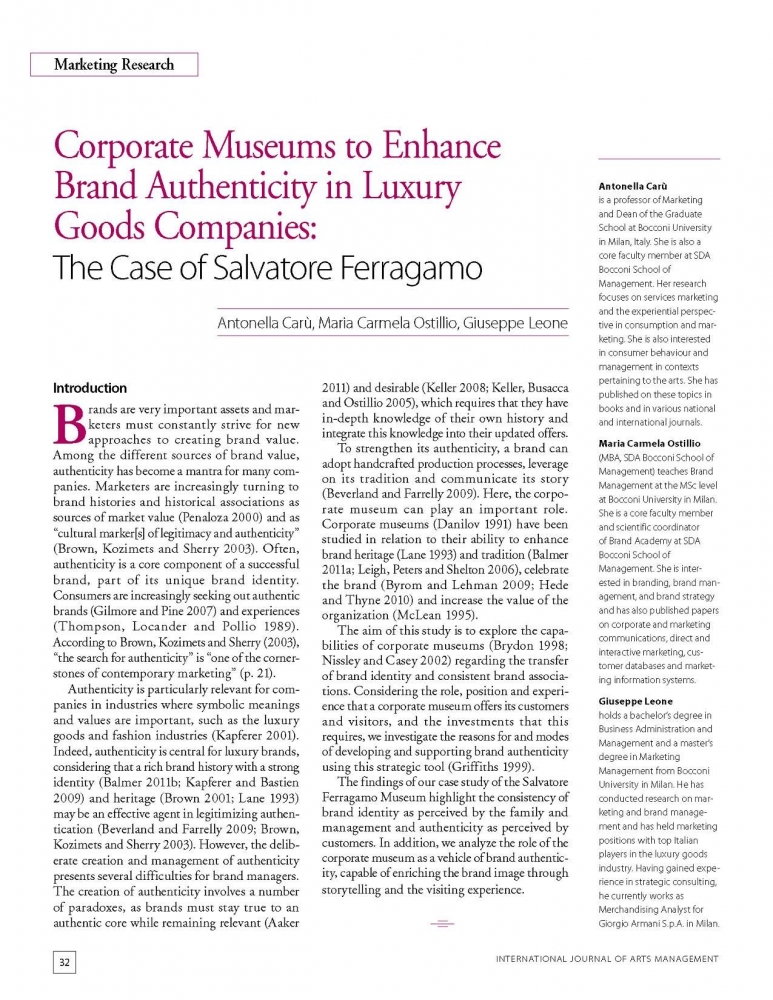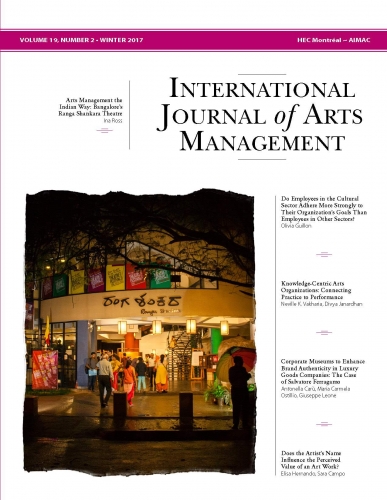Corporate Museums to Enhance Brand Authenticity in Luxury Goods Companies: The Case of Salvatore Ferragamo
Produit: Article
21,00 $ CA
Antonella Carù, Maria Carmela Ostillio, Giuseppe Leone
Antonella Carù is a professor of Marketing and Dean of the Graduate School at Bocconi University in Milan, Italy. She is also a core faculty member at SDA Bocconi School of Management. Her research focuses on services marketing and the experiential perspective in consumption and marketing. She is also interested in consumer behaviour and management in contexts pertaining to the arts. She has published on these topics in books and in various national and international journals.
Maria Carmela Ostillio (MBA, SDA Bocconi School of Management) teaches Brand Management at the MSc level at Bocconi University in Milan. She is a core faculty member and scientific coordinator of Brand Academy at SDA Bocconi School of Management. She is interested in branding, brand management, and brand strategy and has also published papers on corporate and marketing communications, direct and interactive marketing, customer databases and marketing information systems.
Giuseppe Leone holds a bachelor’s degree in Business Administration and Management and a master’s degree in Marketing Management from Bocconi University in Milan. He has conducted research on marketing and brand management and has held marketing positions with top Italian players in the luxury goods industry. Having gained experience in strategic consulting, he currently works as Merchandising Analyst for Giorgio Armani S.p.A. in Milan.
ABSTRACT
Increasingly, relationships are being formed between art and fashion. Companies in the luxury goods and fashion industries endeavour to build this relationship in different ways. In the different approaches taken, the corporate museum seems to play an important role in strengthening the brand and promoting the company’s heritage. Clearly, recognizing history and tradition – considered a hallmark of postmodernity – and the consumer’s search for authenticity have contributed to the proliferation of corporate museums. This study analyzes the authenticity associated with the Salvatore Ferragamo brand, whose corporate museum is viewed as an authentication tool, both within the company (family members and management representatives) and outside it (opinion leaders and visitors).
KEYWORDS
Brand authenticity, corporate museum, brand heritage, luxury brand
RÉSUMÉ
On voit de plus en plus de liens se créer entre l’art et la mode. Des entreprises travaillant dans le domaine des biens de luxe ou dans l’industrie de la mode tentent de développer ces liens de diverses manières. Parmi les approches adoptées, le musée d’entreprise semble jouer un rôle de premier plan en vue de renforcer l’image de marque et de promouvoir le patrimoine de l’entreprise. Manifestement, la reconnaissance de l’histoire et de la tradition – considérées comme des caractéristiques de la postmodernité – et la quête pour l’authenticité de la part du consommateur ont contribué à la prolifération des musées d’entreprises. Cette étude analyse l’authenticité associée à la marque Salvatore Ferragamo, dont le musée d’entreprise est perçu comme un outil d’authentification, aussi bien au sein de l’entreprise (membres de la famille et représentants de la direction) qu’à l’extérieur (leaders d’opinion et visiteurs).
MOTS CLÉS
Authenticité de la marque, musée d’entreprise, patrimoine de la marque, marque de luxe
RESUMEN
Cada vez más se están creando relaciones entre arte y moda. Las empresas de las industrias de productos de lujo y de moda se esfuerzan de múltiples maneras de forjar esta relación. Entre las varias estrategias, el museo de empresa parece desempeñar un papel importante para fortalecer la marca y promover el patrimonio de la compañía. Está claro que reconocer la historia y la tradición – que se consideran una característica de la posmodernidad – y la búsqueda de autenticidad por parte del consumidor, han contribuido a la proliferación de este tipo de museo. En este estudio se analiza la autenticidad que se asocia con la marca Salvatore Ferragamo cuyo museo se considera una herramienta de autentificación, tanto en el seno de la compañía (miembros de familia y representantes de la administración) y fuera de ella (líderes de opinión y visitantes).
PALABRAS CLAVE
Autenticidad de marca, museo de empresa, patrimonio de marca, marca de lujo

